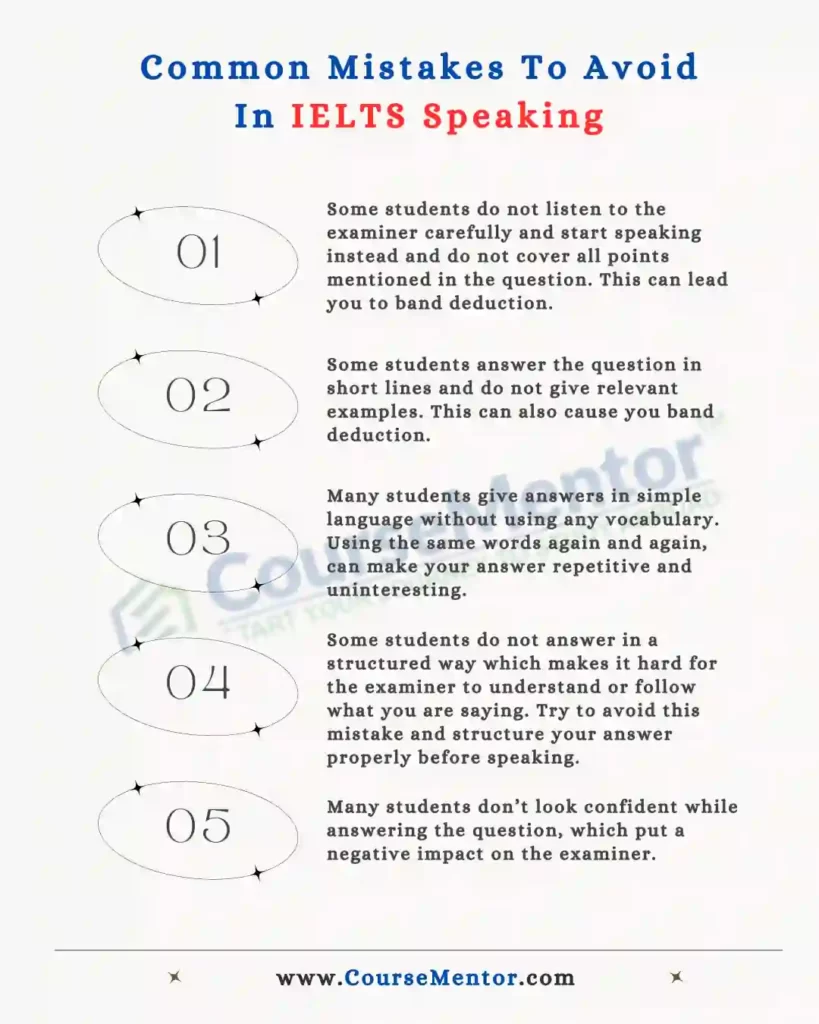Nowadays, every student has a dream of studying abroad in an English country. To complete this dream, they must prove their language proficiency.
For proving language proficiency to study or work in an English-speaking nation, the most popular exam is IELTS.
IELTS measures students’ language proficiency through four different modules;
Listening, Reading, Writing, and Speaking.
The main focus of this blog will be IELTS speaking, and I will cover everything about speaking that is essential for students to know before taking the test.
I will also explain the common mistakes that most students make in the speaking module of the IELTS exam.
If you read the complete blog, I guarantee you that you will feel more comfortable and confident about the speaking test.
From this blog, you will also get some of the best tips that will help you improve your speaking and get the desired score in the exam.
Let’s get started!
IELTS Speaking
This is an important module of the IELTS exam, and if you are aiming to get a good score in the IELTS, you must score well in this module.
This module is more like an interview. In IELTS speaking, the examiner will ask you three types of questions;
- Introductive
- Cue card
- Follow-ups.
Here is the format of the speaking module of the IELTS exam that students must know about before taking the exam.
| Part | Duration | Number of questions | Description |
| Part 1 – Introduction | 4 – 5 minutes | Not fixed | In this, the examiner will ask you questions related to yourself, like your hometown, education, work, or hobbies. Students can answer these questions in 2 to 3 lines. |
| Part 2 – Cue card | 3 – 4 minutes | 1 | This is the second part of the speaking module. In this, the examiner will give you a topic, and you must speak about that topic for at least 1.30 minutes. You will get 1 minute to prepare for the cue card topic. |
| Part 3 – Follow-ups | 4 – 5 minutes | Not fixed | This is the last part of the speaking module, and in this, the examiner will ask you some general questions that may or may not be related to the cue card. Students must answer these questions in minimum 3 to 4 lines for better results. |
Question-wise Tips For IELTS Speaking
Here, you will get the best question-wise tips that will help you get 7+ bands in the speaking module.
Tips For Introduction Part
- As this is the introductive part of the speaking module, you must prepare yourself to talk about yourself, your family, work, etc. Try to use simple vocabulary for this part and support your answer with a valid reason.
- Do not give memorized answers. The examiner will know whether you are giving a memorized answer or answering the question by yourself. Memorized answers can affect your score, and you may fail to get a good score in the speaking module.
- Don’t just answer yes or no. Try to extend your answer a little (don’t give long answers in this part). Just give a relevant example to support your answer.
Here is a sample question and answer for the first part of IELTS speaking.
For example, if the examiner asks you, “Do you love coffee?” You can answer like, “Yes, I do. I have a cup of coffee in the morning as it helps me wake up.”
Read our other blog to learn how to introduce yourself in IELTS speaking.
Tips For Cue-card Part
- In this question type, the examiner will give you 1 minute to prepare your answer, souse that 1 minute wisely and make an outline or structure of the cue card.
- Follow a proper structure, start with an introduction, then come to the main idea of your topic, and then end your topic with a closing statement or conclusion. You can use “all in all” or “finally.” Use connectors to connect the lines.
- In the IELTS speaking cue card, you must use advanced-level vocabulary for expressing your ideas, opinion, or event.
- Cover all the key points given with the cue card before the examiner stops you. If you don’t cover all the key points, this may affect your overall score of speaking.
Tips For follow-ups Part
- Practice high-level, complex topics like environment, politics, and society. The examiner can also ask you your opinion about something.
- Don’t give short answers in 1 or 2 lines, instead, extend your answers. You can give relevant examples to extend your answers.
- The examiner is looking at how well you can engage in a conversation in English. So first listen carefully to the examiner and after that start speaking. If you can’t understand a question, you can ask the examiner to elaborate the question.
Read our other blog to get strategies to improve your speaking skills.
Common Mistakes To Avoid In IELTS Speaking

- Some students do not listen to the examiner carefully and start speaking instead and do not cover all points mentioned in the question. This can lead you to band deduction.
- Some students answer the question in short lines and do not give relevant examples. This can also cause you band deduction.
- Many students give answers in simple language without using any vocabulary. Using the same words again and again, can make your answer repetitive and uninteresting.
- Some students do not answer in a structured way which makes it hard for the examiner to understand or follow what you are saying. Try to avoid this mistake and structure your answer properly before speaking.
- Many students don’t look confident while answering the question, which put a negative impact on the examiner.
IELTS Speaking Scoring System
Your speaking in the IELTS exam is evaluated through four different criteria.
Let’s have a look at IELTS speaking scoring system.
- Fluency and coherence – This access how fluently you can speak the English language without Stammering.
- Lexical resource – This criterion measures how you use vocabulary in your answers.
- Grammatical range and accuracy – You can speak fluent English using advanced-level vocabulary, but what about grammar and accuracy? This criterion measures how well you can speak grammatical error-free English.
- Pronunciation – Through this criterion, the examiner measures how well you can pronounce any word.
Conclusion
For many students, the IELTS speaking part can be challenging, but with proper guidance, they can easily score well in it.
This is all a student must know about the speaking module in IELTS before taking the test.
Here you have got the format of the speaking module, with question-wise tips that can help you improve your speaking score.
I have also mentioned some common mistakes many students make while answering questions in IELTS speaking.
You must avoid these mistakes for the best result, and if you still have any questions, please contact our experts.
Keep visiting CourseMentor™ for more content like this.
FAQs
How can I improve my pronunciation for the IELTS Speaking test?
To improve your pronunciation, listen to and try to copy the native speakers, pay attention to word and sentence stress, practice pronunciation exercises, and record yourself while speaking and listen back to find areas you need improvement.
Can I use slang or informal language in the IELTS Speaking test?
No, slang or informal language is unacceptable in the IELTS speaking test. But you can use idiomatic expressions that are related to your topic.


